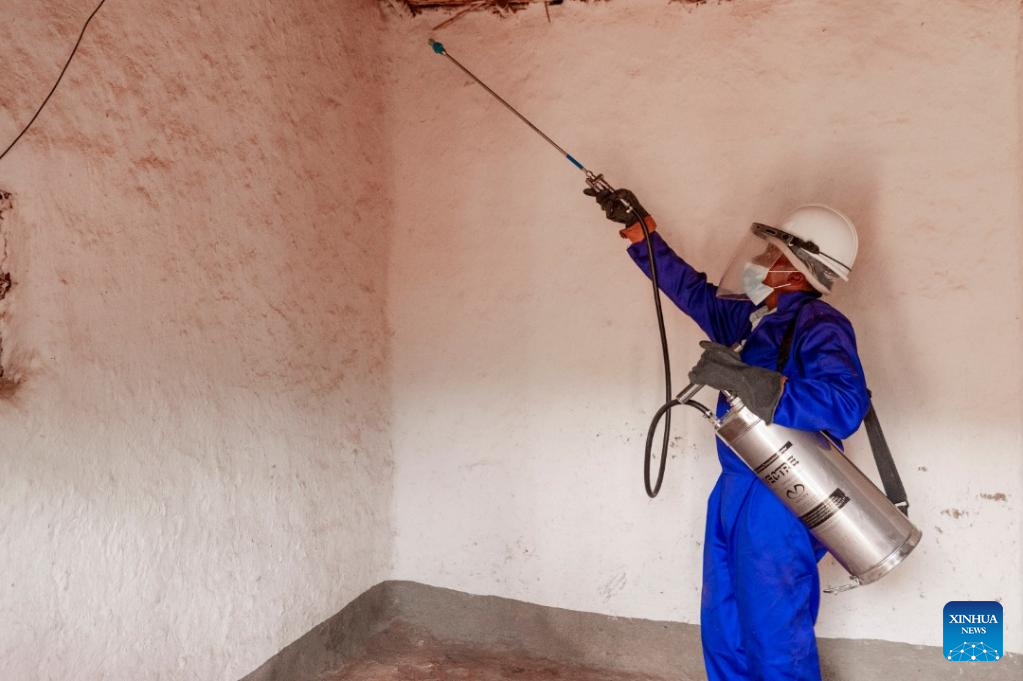
A staff member sprays insecticides on the interior walls of a house in Ruhango District in southern Rwanda, April 21, 2023. Endemic districts have been the target in a national drive to end malaria in Rwanda.
The campaign involves spraying insecticides on the interior walls and surfaces of households in the districts worst affected by malaria, according to the Rwanda Biomedical Center (RBC).
(Rwanda Biomedical Center/Handout via Xinhua)
KIGALI, April 26 (Xinhua) -- Endemic districts have been the target in a national drive to end malaria in Rwanda.
The campaign involves spraying insecticides on the interior walls and surfaces of households in the districts worst affected by malaria, according to the Rwanda Biomedical Center (RBC).
The districts are spread in different parts of the country, including southern and eastern Rwanda.
Speaking during an awareness campaign in Ruhango District marking this year's World Malaria Day on Tuesday, Beatus Cyubahiro, senior entomology officer in the RBC malaria division, said indoor residual spraying has been scaled up from three to 12 districts with the highest burden of malaria cases.
"It is part of the country's comprehensive malaria control strategy," he said.
Citing the latest RBC figures, Cyubahiro said a significant reduction in malaria cases has been realized in 2022 due to measures like indoor residual spraying.
In Ruhango District, for example, where 91 percent of the 108,297 households are sprayed, malaria cases dropped to 39,000 last year, down 88.5 percent from about 340,000 cases in 2018.
Nationally, Rwanda has also significantly cut the burden of malaria, with the infection rate falling from 409 cases per 1,000 people in 2017 to only 76 cases per 1,000 people in 2023, a drop of 81.4 percent, according to RBC data.
Malaria deaths also fell by more than 89 percent over the same period.
Bernadette Isabane, a farmer, recalled the time when she last suffered from malaria.
"I contracted malaria during a busy planting season in 2021," the 44-year-old mother of three, a resident of Ruhango District in southern Rwanda, told Xinhua.
"After feeling unwell, I was admitted for a few days in hospital," she said.
Days before, her husband had also fallen sick from malaria, interrupting for days his carpentry work, Isabane said.
In the swampy areas of Ruhango District, malaria infection used to be prevalent among many residents, even though they use mosquito bed nets. "I suspect mosquitos bit us in the sitting rooms before us going to bed," Isabane said.
This year, however, no one in her family has suffered from malaria, thanks to indoor spraying.
The indoor residual spraying works alongside other interventions, including the distribution of one net for every two household members, timely diagnosis and treatment, and community education on malaria prevention, said Cyubahiro of the RBC malaria division.
Carine Giramata, a community health worker, said residents are given up to three days to empty their houses before indoor residual spraying is conducted.
She said residents are also sensitized on various other malaria preventive measures such as eliminating mosquito breeding sites near home as well as sleeping under bed nets.
To ensure the efficacy of insecticides, the RBC has set up research sites across the country where laboratory research is done to determine the effectiveness of insecticides based on the vector species.
A preventable disease spread by mosquitoes, malaria kills roughly 600,000 people globally each year, mostly children who are vulnerable, and sickens more than 200 million people, according to the World Health Organization.
Symptoms range from fever, intense headaches to vomiting as well as body-shaking chills.
The Rwandan Ministry of Health said it has also scaled up community-based malaria treatment, now covering about 60 percent of all malaria cases, up from 52 percent in 2017, contributing to lower fatalities. ■
